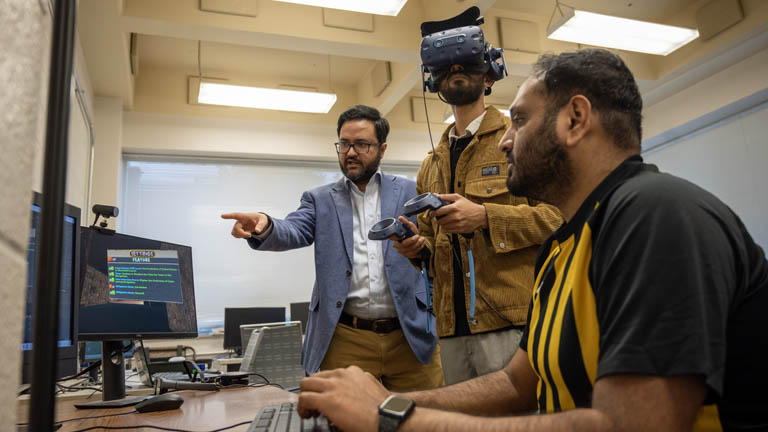
Our Goal
We will cultivate a culture of teaching and learning that empowers every student to excel. Our strategies emphasize digital fluency, experiential and applied learning, and high-impact academic experiences that deepen engagement and knowledge. We aim to expand access and affordability through scholarships, flexible pathways and financial support while strengthening advising, mentoring and academic infrastructure. By integrating career development across programs and promoting professional, leadership and lifelong learning skills, we will ensure our students are prepared to thrive in their studies, careers and communities.
Pillar I.1: Improve Student Academic Experience
Tactics
- Offer regular faculty teaching workshops and peer-observation programs
- Recognize instructional excellence through awards and communications
- Utilize NSF RED grant to encourage AI-enabled and neuroinclusive teaching practices
- Incentivize Scholarship of Teaching and Learning (SoTL) through seed grants and recognition
Tactics
- Promote AI undergraduate certificate and develop discipline-specific AI courses
- Utilize RED and T4LC resources to encourage AI integration across curricula
- Support quantum-computing training through courses, hackathons and internships
Tactics
- Expand project-based courses and design experiences across all years
- Increase access to undergraduate research and student organizations
- Embed interdisciplinary and global learning opportunities
Tactics
- Institute curricular requirement for ≥ 3 high-impact practice
- Develop zero-credit courses to recognize co-curricular experiences
Tactics
- Offer workshops on research communication, proposal writing and leadership skills
- Provide mentoring and career-readiness programming for graduate students
Pillar I.2: Enhance Access and Affordability
Tactics
- Increase endowments for undergraduates scholarships through advancement campaigns
- Expand graduate fellowships and competitive PhD stipends
- Develop need-based and bridge scholarships for transfer and first-generation students
Tactics
- Critically evaluate online program development to align with industry needs
- Develop short-term workshops and stackable learning opportunities
- Strengthen community college partnerships for dual enrollment and transfer pathways
Tactics
- Partner with Financial Aid and Advancement to simplify scholarship and emergency aid access
Pillar I.3: Support Retention and Degree Progression
Tactics
- Train and expand peer mentoring programs for community building and academic navigation
- Leverage NSF grant initiatives on AI-driven mentoring advising
- Institute mandatory faculty advising in junior year for career and graduate planning
Tactics
- Expand tutoring, supplemental instruction and academic coaching for gateway courses
- Maintain updated program requirements and teaching plans in Stellic for all programs
- Strengthen and expand the Summer Bridge Program for academic readiness and belonging
Tactics
- Embed study skills and self-regulated learning modules into first year courses
- Connect first year students with mentoring and experiential opportunities early
Tactics
- Streamline curricula to remove redundancies and promote timely progression
- Align course prerequisites and sequences to minimize bottlenecks
Tactics
- Develop systematic tracking of graduate milestones (coursework, exams, defenses)
- Collaborate with directors of graduate studies to review and streamline program requirements
- Provide mentoring training and resources for faculty advising graduate students
Pillar I.4: Support Career Readiness and Professional Development
Tactics
- Embed career readiness modules in core courses and seminars
- Collaborate with MU Career Services to deliver tailored workshops and coaching
Tactics
- Increase participation in internships, co-ops, research assistantships and leadership roles documented through zero-credit experiences
- Offer elective professional practice or career readiness courses
Tactics
- Provide workshops and certificates in leadership, project management, teamwork and communication
- Encourage participation in student organizations and competitions
Tactics
- Introduce micro-credentials and digital badges for technical and professional skills
- Offer graduate level professional development seminars on academic and non-academic careers